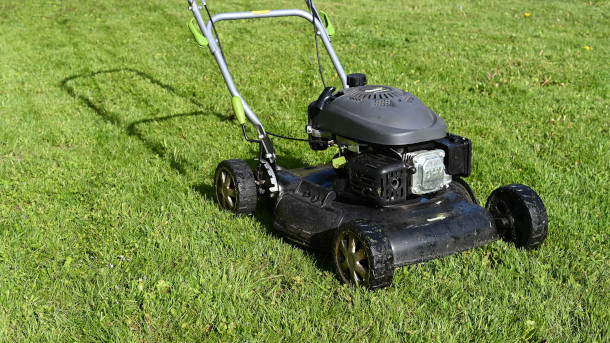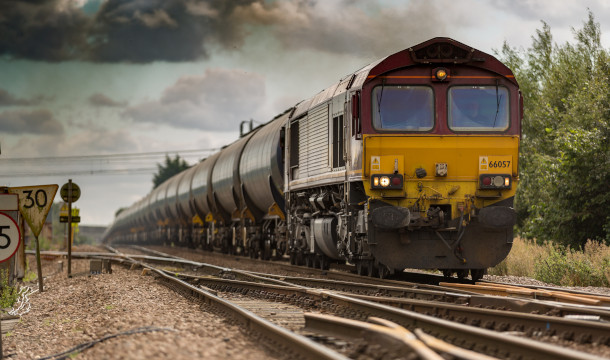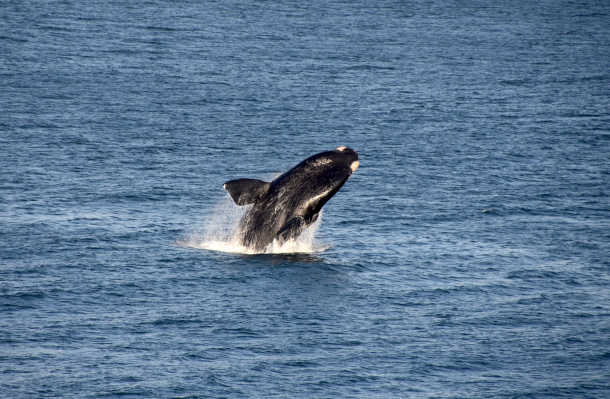Beyond the Headlines
Air Date: Week of May 5, 2023

Clean-air advocates claim the pollution emitted by small gasoline engines used to power lawn mowers and leaf blowers are harmful to human health and the environment. (Photo: Andres Siimon, Unsplash)
This week, Living on Earth contributor Peter Dykstra joins Host Jenni Doering to discuss a growing movement in U.S. cities to ban or restrict noisy and highly polluting gas-powered leaf blowers and lawnmowers. Another set of rules in California aims to reduce air pollution from diesel locomotives. And in history, whales mistaken for submarines were among the unfortunate casualties of the brief, undeclared war between Britain and Argentina over control of the Falkland Islands in 1982.
Transcript
BASCOMB: It’s Living on Earth, I’m Bobby Bascomb.
DOERING: And I’m Jenni Doering.
It's time now for a look beyond the headlines with Peter Dykstra. He's our living on Earth contributor, and he joins us from Atlanta, Georgia. Hey Peter, how you doing this week?
DYKSTRA: I'm doing all right, Jenni, I hope you're doing well. And there's some good news on the horizon for any of us who like me get to listen to and inhale all of those two stroke engine, leaf blowers, lawn mowers, edgers, all the lawn equipment that's in use by commercial firms and homeowners that are both a climate change threat and a threat if they're used without protection to the lungs and ears of hundreds of 1000s of people. But there are several jurisdictions that have now stepped forward or are stepping forward to begin to ban or restrict these noisy polluting unhealthful machines.
DOERING: Wow, that's probably good for our health and our sanity. So what are the places banning these things Peter?
DYKSTRA: Places like Washington DC have had an outright ban to $500 fine for using any of these gasoline engines. California has restrictions rolling in in the next few years. Burlington, Vermont, Vancouver, British Columbia, Denver and other cities and jurisdictions are coming to realize that the cost of a well manicured lawn shouldn't be potential pollution, lung disease, asthma, and all of the things that gasoline engines from lawn equipment can bring.
DOERING: And by the way, elsewhere in the broadcast, we've got a segment about no mo may if you want to skip the mowing entirely.
DYKSTRA: No mo may and then there are other things like zero scaping the practice of landscaping without ornamental grass and using as little water as possible.
DOERING: All great ideas. What else do you have for us this Peter?
DYKSTRA: California develop emissions rules for locomotives. There's diesel locomotives that are particularly intensively used in California. Ports, like Long Beach that receive container ships from Asia and really all over the world to bring goods to America that are then loaded onto either trains powered by diesel locomotives, or trucks powered by diesel engines. It's not only a climate issue and a public health issue. But it's considered to be an environmental justice issue, since places like Long Beach tend to have poor and minority neighborhoods backed up to big cargo ports and terminals.

California approved a rule that will ban diesel locomotive engines more than 23 years old by 2030 and increase the use of zero-emissions technology to transport freight from ports and throughout railyards. (Photo: Ankush Minda, Unsplash)
DOERING: So it's good news for those communities. But what is the industry saying Peter?
DYKSTRA: The industry is not too happy. They've seen this coming for a while. They are of course, slow to respond. But electric vehicles have pretty much arrived. Electric trains have been around for a long time. It's a little bit more complicated to get freight trains operating on electricity, but it's something that can be done. And increasingly we're learning that for health and climate reasons it eventually has to be done.
DOERING: Wonderful. So from looking ahead to the future, let's look back into the past now, Peter, what do you got for us?
DYKSTRA: On May 12 1982, something really strange happened. According to crew diaries from the Royal British navy, who in 1982 was at war with Argentina for control of the Falkland Islands, the HMS brilliant British navy ship torpedoed at least two Southern Right whales, thinking they were Argentine, mini subs, there's a helicopter that may have killed a third whale. We don't know about others. But it was a really bizarre and unfortunate case of Southern Right whales becoming casualties of war.

Crew diaries revealed that on May 12, 1982, the British Navy torpedoed endangered Southern right whales, after mistaking them for enemy submarines. (Photo: Olga Ernst, Wikimedia Commons, CC BY-SA 4.0)
DOERING: I imagine it must have been pretty gruesome for these crews to discover that they had not in fact targeted a submarine but a majestic whale.
DYKSTRA: Gruesome enough that it wasn't talked about for many years. Until these crew diaries were revealed. Southern Right Whales are considered to be a separate species from Northern right whales. The southern whales are still endangered, but not nearly as gravely threatened as the northern right whales.
DOERING: Well, thank you so much. Peter, Peter Dykstra is a weekly living on Earth contributor, and we'll talk to you again next week.
DYKSTRA: All right Jenni, thanks a lot. We'll talk to you soon.
DOERING: And there's more on the stories on the living on Earth website. That's LOE.org.
Links
AP News | “California Passes 1st-In-Nation Emission Rules For Trains”
The Times UK | “Royal Navy Ship Torpedoed Whales in Falklands”
Living on Earth wants to hear from you!
Living on Earth
62 Calef Highway, Suite 212
Lee, NH 03861
Telephone: 617-287-4121
E-mail: comments@loe.org
Newsletter [Click here]
Donate to Living on Earth!
Living on Earth is an independent media program and relies entirely on contributions from listeners and institutions supporting public service. Please donate now to preserve an independent environmental voice.
NewsletterLiving on Earth offers a weekly delivery of the show's rundown to your mailbox. Sign up for our newsletter today!
 Sailors For The Sea: Be the change you want to sea.
Sailors For The Sea: Be the change you want to sea.
 The Grantham Foundation for the Protection of the Environment: Committed to protecting and improving the health of the global environment.
The Grantham Foundation for the Protection of the Environment: Committed to protecting and improving the health of the global environment.
 Contribute to Living on Earth and receive, as our gift to you, an archival print of one of Mark Seth Lender's extraordinary wildlife photographs. Follow the link to see Mark's current collection of photographs.
Contribute to Living on Earth and receive, as our gift to you, an archival print of one of Mark Seth Lender's extraordinary wildlife photographs. Follow the link to see Mark's current collection of photographs.
 Buy a signed copy of Mark Seth Lender's book Smeagull the Seagull & support Living on Earth
Buy a signed copy of Mark Seth Lender's book Smeagull the Seagull & support Living on Earth

